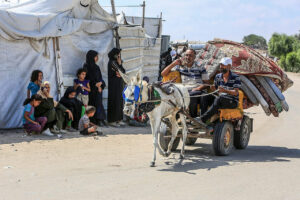Israel issues more evacuation orders in South Gaza, shrinking humanitarian zones

Palestinians with their belongings after fleeing from Hamad City to safe areas toward Al-Mawasi Khan Younis, southern Gaza, 11 August 2024
Jack Khoury and The Associated Press report in Haaretz on 18 August 2024:
The Israeli military has been increasing its pressure on the civilian population in the Gaza Strip to evacuate from several residential areas in its north and south in the past few days, saying the evacuation announcements followed rocket fire and the targeting of troops from the area. Many Gazans claim the evacuations are another form of pressure on the civilian population amid hostage/cease-fire deal negotiations in Doha.
On Saturday morning, the military called on residents of the Maghazi refugee camp in central Gaza to evacuate toward the area that has been declared a “safe zone” in the southern Gaza Strip. On Friday, it called on civilians in northern Khan Yunis, Beit Hanoun (in central Gaza) and Deir al-Balah (in central Gaza) to evacuate to an area designated as “humanitarian” on the coast, the area of which has been reduced.
The military issued evacuation calls throughout July, including calls for all Gaza City residents to evacuate southward to Deir al-Balah early in the month. According to The New York Times, this reduced the safe zone by more than a fifth. According to the UN, most of Gaza’s population has been displaced, including many who have been forced to evacuate multiple times. Over the course of the war, the military has called on Palestinians to evacuate from some 84 percent of the Gaza Strip, the UN has said.
According to rescue services in Hamas-ruled Gaza, the shrinking of the permitted zones in Khan Yunis, Deir al-Balah, Maghazi and the Zawaida refugee camp puts the lives of some 450,000 displaced people at risk and is worsening the humanitarian disaster in Gaza.
On Saturday, the air force bombed a location in Zawaida, where, according to the military, armed individuals were firing rockets. Reports in Gaza indicated that a building and warehouse at the city entrance, where more than 40 people sought shelter, had been struck. Shuhada al-Aqsa Hospital in Deir al-Balah reported that at least 17 people had been killed in the strike, including 12 members of one family: Sami Jawad al-Ejlah, nine of his children (aged 2 to 22), his wife and his mother-in-law. Al-Ejlah coordinated with the Israeli military to bring meat and fish into Gaza.
The military said in response that it had targeted “terrorist infrastructure from which numerous launches had been made toward Israeli territory and troops operating in the area in recent weeks. Reports were received that the strike killed civilians who were in a building adjacent to the terrorist infrastructure. The incident is under investigation.”
Satellite images from the past few days showing the western Khan Yunis neighborhood of Hemed, which was built for the poor in 2016 with Qatari financing, indicate a massive evacuation of displaced people who had been living in tents. The air force has intensified strikes against residential high-rises in the western part of the city in recent days. The overwhelming majority of the buildings have been severely damaged in the strikes, but there have been no reports of casualties for days, presumably because of the evacuation.
Conversely, despite calls to evacuate large parts of central Gaza, no long convoys of people were observed leaving the area on Saturday; throughout the war, the population has evacuated preemptively, sometimes without knowing whether another location was available for shelter. There is no safe place, say many Gazans. Everywhere designated a safe place has already been hit multiple times, they say. Many displaced people say overcrowding has made it impossible to find a free spot to set up a tent or shack, even if for only a limited time.
Hamas called the evacuation orders “a direct continuation of the policy of collective punishment of Gazans.” It accused Israel of using dispossession as a weapon against civilians to break them and exacerbate their suffering. “With the renewal of the negotiations and round of talks, we see the United States as directly responsible for the crimes of the occupation,” Hamas said.
This article is reproduced in its entirety
